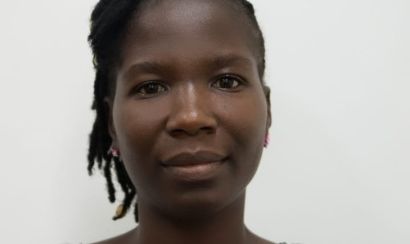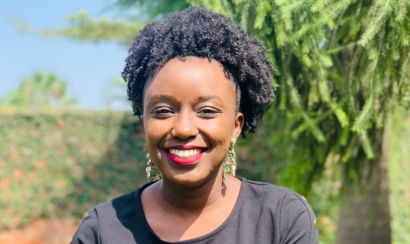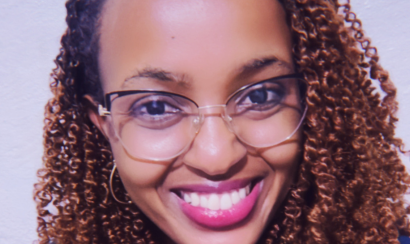In My Own Words: Nadia Onsando

Tell me about your life before One Acre Fund. What career did you want to pursue?
I have always wanted to work with people because I enjoy working with people. I enjoyed the concept of HR just in terms of what it should be: improving people's work lives, helping them grow, and helping them realize how they can grow, whether it's within their organization or outside of it.
What’s your favorite part of your role or day? What gets you excited about work?
I think it's when I have a new project, particularly if it is something I’ve never done before or one that requires a new take on something I’ve already done. Working with new people gets me excited. Luckily, there are tons of opportunities for it every couple of months, either for something we are improving or working on a new system that we're trying to get off the ground. That’s the favorite part of the work that I do. The favorite part of my day is when I’ve gone through a reasonable number of emails (laughs) and reduced unread emails to single digits. Something people don't prepare you for is the number of emails you will get in a day, and so when that number is down to like three or four, it is an amazing feeling.
Right now, we serve more than a million farmers in nine countries. What does it mean to you to know that we work at that kind of scale?
I mean, it's amazing! Sometimes I forget that we work at that sort of scale, then I’ll travel home, and during a conversation, my grandmother will say something like, ‘oh, people from your organization were here the other day.’ Then it hits me: that ‘on the ground’ as we like to say, we are creating profound impact for farmers and helping build quality livelihoods. It is also like that whenever I travel to the field.
When I first went to the field during my orientation and stayed with a farmer, a woman, and her children, it opened my eyes to the importance of our work. When I reflect on that farmer’s story and consider that it is also the testimony of more than a million other farmers, it is nothing short of incredible. I’m in awe of what different teams, particularly the field team, do in daily service to farmers.

One of our Field Officers shares a cheer with a group of farmers prior to helping them enrol with us.
Shifting gears a little, what's your favorite thing to do outside of work? Any hobbies or secret superpowers?
(Laughs) So, this is how you find out I’m Wonder Woman. Well, I love to listen to podcasts. I love to read. I love to play the ukulele, and I love watching horror movies -- gosh, I love horror movies! I just think it's such a great film genre. I don't feel the terror people feel; I just go, ‘Wow, that was scary.’ I’d be impressed if a horror movie terrified me. I know they aren’t for everyone, but they are ‘it’ for me.
What’s been the most challenging part about adjusting to working from home? And what have you enjoyed the most?
Let me start with the good: I have enjoyed working from home. It's given me a lot of experience planning my day, and I've enjoyed managing my own time. During my free time, I listen to a lot of podcasts.
Initially, the hardest thing was logging off, which affected my sustainability slightly, but then I mastered it. In the beginning, it felt like there was more pressure to prove myself by delivering more -- like if I get an email, I should respond immediately so that the sender knows I am on the other side of the screen doing my job. I’d even respond past 7 pm because why stop? But then I gradually realized that was not a sustainable work ethic. Of course, there are days I go over time, like if I started late, but it is a conscious decision. I’ve gone back to controlling my own time.
Any podcasts you’d recommend?
There are a number of them. There’s ‘Death, Sex and Money,’ which I find fascinating. It's just about life and how death, sex and money are the things that affect our lives in such big ways, even though people don’t like to talk about them. ‘Legally Clueless’ and ‘Why Do We Do It’ are also favorites of mine. I also found one recently called ‘This is Uncomfortable,’ where the host talks to people about uncomfortable situations they’ve been through. It is fascinating.
What skills have you gained during your time here?
That’d be my Google Sheets proficiency. My understanding of it has deepened, and I have a very deep appreciation for it now. I think Google Sheets has some of the most amazing features ever. Knowing how to use more formulas and other functions has been great, but I also know I have got so much more to learn -- and I’m going to. It is amazing because computing quickly goes hand in hand with data analysis, which is core to finding solutions.
Let’s have some fun. If you hosted a talk show, who’d be your first guest, and why?
I’d host a panel of women who’ve impacted my life: my mom, aunts and cousins, and some women I’ve worked with. Throughout my life, I’ve received little nuggets of wisdom from these women. Every time we talk, I’m like, ‘Where did they get this from? They must know so much more.’ Sometimes we don’t know or understand the stories of the older women in our lives, so the older I get, the more I want to learn from them.
If you could have a lifetime supply of just one thing, what would that thing be?
I’d choose books of different genres: murder mysteries, thrillers, and books about life.
You’ve had a direct report for a minute now. What is one thing about management you wish you'd been told earlier?
Sometimes you won't know everything, and that's okay. Just because you’re a manager doesn't mean you have all the answers to every problem; sometimes, it means rallying your team to figure it out together.
Thank you. Let's talk about our culture. What do you think is the most distinctive part of our culture?
I've learned that micromanagement isn’t necessary. For many organizations, including some I’ve worked for, there's a very heavy emphasis on the idea that someone is always watching. Here, people are trusted to get their job done and own the result of their work. It took me a while to get used to, but it is both cool and amazing.
As we wrap up, what advice would you give to other female leaders/people who are early in their careers who want to make a difference?
One, don't be afraid to make mistakes. Two, don't be afraid of the fact that you don't know everything. Three, don't be afraid to ask for more. I think a lot of the time, women in the workplace are highly disadvantaged in that, you get into your position, you're comfortable with the work you do, and you feel like you can do more, but you're not quite sure how to go about that or how to ask. Or maybe you're given a new responsibility, and you're not quite sure how everything works, and there's a lot of stigma placed on how to deal with that, especially early on in a career. From my own experience, you have to be able to recognize the space you occupy in your place of work and say, ‘I should be comfortable in/with that.’




